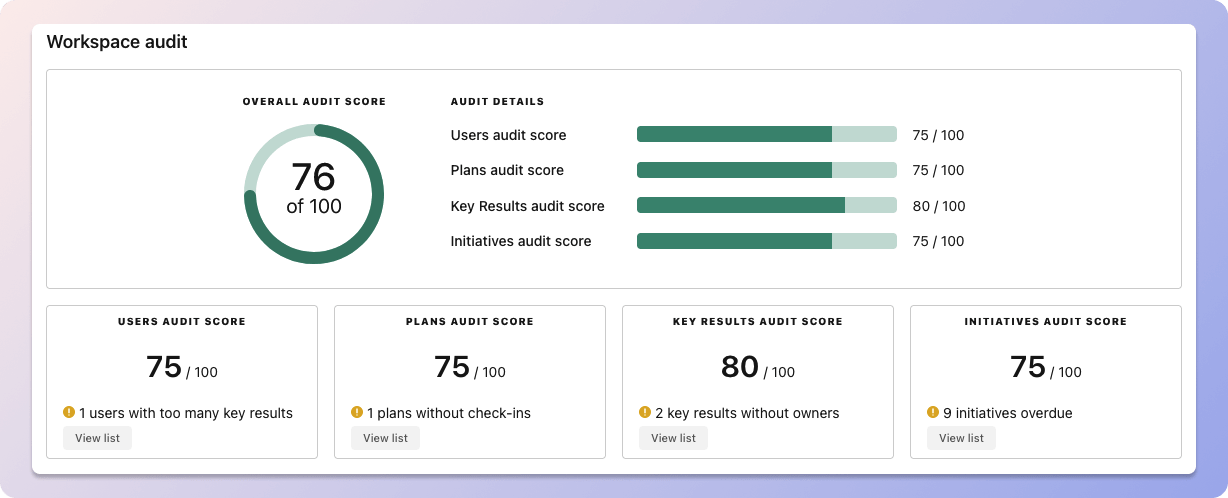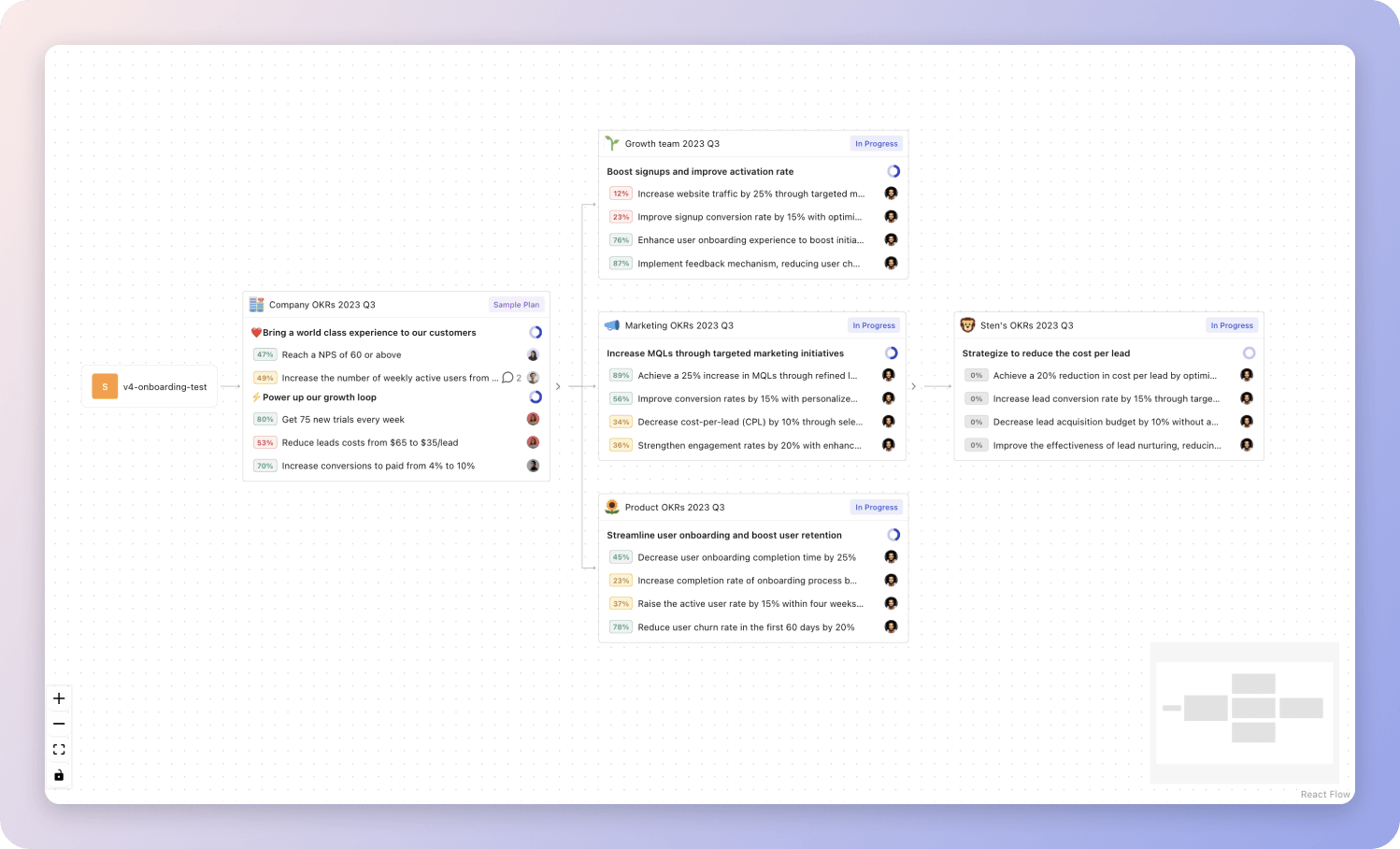6 OKR examples for Team Coordination Team
What are Team Coordination Team OKRs?
The Objective and Key Results (OKR) framework is a simple goal-setting methodology that was introduced at Intel by Andy Grove in the 70s. It became popular after John Doerr introduced it to Google in the 90s, and it's now used by teams of all sizes to set and track ambitious goals at scale.
OKRs are quickly gaining popularity as a goal-setting framework. But, it's not always easy to know how to write your goals, especially if it's your first time using OKRs.
To aid you in setting your goals, we have compiled a collection of OKR examples customized for Team Coordination Team. Take a look at the templates below for inspiration and guidance.
If you want to learn more about the framework, you can read more about the OKR meaning online.
Best practices for managing your Team Coordination Team OKRs
Generally speaking, your objectives should be ambitious yet achievable, and your key results should be measurable and time-bound (using the SMART framework can be helpful). It is also recommended to list strategic initiatives under your key results, as it'll help you avoid the common mistake of listing projects in your KRs.
Here are a couple of best practices extracted from our OKR implementation guide 👇
Tip #1: Limit the number of key results
Having too many OKRs is the #1 mistake that teams make when adopting the framework. The problem with tracking too many competing goals is that it will be hard for your team to know what really matters.
We recommend having 3-4 objectives, and 3-4 key results per objective. A platform like Tability can run audits on your data to help you identify the plans that have too many goals.
 Tability's audit dashboard will highlight opportunities to improve OKRs
Tability's audit dashboard will highlight opportunities to improve OKRsTip #2: Commit to the weekly check-ins
Setting good goals can be challenging, but without regular check-ins, your team will struggle to make progress. We recommend that you track your OKRs weekly to get the full benefits from the framework.
Being able to see trends for your key results will also keep yourself honest.
 Tability's check-ins will save you hours and increase transparency
Tability's check-ins will save you hours and increase transparencyTip #3: No more than 2 yellow statuses in a row
Yes, this is another tip for goal-tracking instead of goal-setting (but you'll get plenty of OKR examples below). But, once you have your goals defined, it will be your ability to keep the right sense of urgency that will make the difference.
As a rule of thumb, it's best to avoid having more than 2 yellow/at risk statuses in a row.
Make a call on the 3rd update. You should be either back on track, or off track. This sounds harsh but it's the best way to signal risks early enough to fix things.
Building your own Team Coordination Team OKRs with AI
While we have some examples below, it's likely that you'll have specific scenarios that aren't covered here. There are 2 options available to you.
- Use our free OKRs generator
- Use Tability, a complete platform to set and track OKRs and initiatives
- including a GPT-4 powered goal generator
Best way to track your Team Coordination Team OKRs
Quarterly OKRs should have weekly updates to get all the benefits from the framework. Reviewing progress periodically has several advantages:
- It brings the goals back to the top of the mind
- It will highlight poorly set OKRs
- It will surface execution risks
- It improves transparency and accountability
Spreadsheets are enough to get started. Then, once you need to scale you can use a proper OKR platform to make things easier.
 Tability's Strategy Map makes it easy to see all your org's OKRs
Tability's Strategy Map makes it easy to see all your org's OKRsIf you're not yet set on a tool, you can check out the 5 best OKR tracking templates guide to find the best way to monitor progress during the quarter.
Team Coordination Team OKRs templates
We've covered most of the things that you need to know about setting good OKRs and tracking them effectively. It's now time to give you a series of templates that you can use for inspiration!
We've added many examples of Team Coordination Team Objectives and Key Results, but we did not stop there. Understanding the difference between OKRs and projects is important, so we also added examples of strategic initiatives that relate to the OKRs.
Hope you'll find this helpful!
OKRs to enhance project planning and team coordination
Enhance project planning and team coordination
Cut down process issues by 25% through prioritizing and addressing planning obstacles
Identify primary roadblocks causing process delays
Implement changes and measure improvements
Develop strategies to mitigate identified obstacles
Provide comprehensive training to all team members on project planning software by quarter-end
Identify required skill levels for project planning software
Develop a comprehensive training program
Schedule training sessions for all team members
Implement a system of weekly project update meetings to boost coordination
Assign a coordinator to manage meetings
Schedule weekly project update meetings
Develop an agenda for each update meeting
OKRs to efficiently manage and coordinate the Trello board
Efficiently manage and coordinate the Trello board
Reduce overdue tasks on Trello by 20%
Prioritize and reassign less urgent tasks to the team
Implement daily reminders for due tasks
Enhance task management training for all team members
Improve response time to task updates on Trello to less than 1 hr
Set mobile notifications for immediate Trello task updates
Prioritize responding to Trello updates promptly
Schedule regular intervals to check Trello throughout the day
Increase task completion rate on Trello by 25%
Implement daily reminders for pending tasks
Enhance visibility of task deadlines
Conduct weekly task completion training sessions
OKRs to enhance collaboration and stimulate thought leadership
Enhance collaboration and stimulate thought leadership
Conduct 4 leadership training workshops to foster thought leadership
Identify topics and designing the content for the leadership workshops
Coordinate with facilitators and arranging the necessary resources
Send invitations and schedule the four leadership training workshops
Implement 5 successful cross-functional projects to boost team collaborations
Develop clear communication guidelines and timelines
Identify and assign cross-functional team members for each project
Establish metrics for success and regular progress checks
Increase the average audience engagement rate on team discussions by 20%
Implement interactive activities during team discussions
Incorporate feedback sessions post-discussions
Provide comprehensive training for engagement techniques
OKRs to finalize and launch our product
Finalize and launch our product
Secure two client pre-orders for the new product before launch
Initiate contact and secure pre-orders
Develop an enticing pre-order sales pitch for the new product
Identify two potential high-value clients for outreach
Assemble dedicated project team for streamlined product finishing tasks
Delegate specific tasks within the project to each team member
Formulate a communication and collaboration system for the team
Identify individuals with necessary skills for product finishing
Achieve at least 96% completion of the product's testing by next quarter
Create a detailed testing schedule and assign responsible team members
Implement any necessary corrective actions promptly
Conduct regular check-ins to monitor testing progress
OKRs to successfully migrate admin application to existing platform
Successfully migrate admin application to existing platform
Train all users on the new platform to ensure smooth transition
Monitor user experience for further improvements
Develop comprehensive training materials on the new platform
Organize training sessions for all users
Complete data migration without any loss or errors
Perform a full backup of all existing data
Verify and validate migrated data
Use reliable software to conduct data migration
Update all functionalities to align with existing platform requirements
Identify and note necessary updates for functionalities
Review current platform requirements thoroughly
Implement and test functionality updates
OKRs to streamline vendor coordination for efficient talent acquisition
Streamline vendor coordination for efficient talent acquisition
Raise vendor performance satisfaction by 30% as measured through quarterly survey
Increase training programs for vendor management
Improve communication frequency with vendors
Implement regular vendor performance reviews
Reduce vendor response time by 20% to expedite recruitment process
Provide vendors with specific response deadlines
Implement a streamlined communication system with vendors
Regularly review and optimize vendor processes
Plug in process gaps to improve vendor coordination, reducing errors by 15%
Regularly evaluate implemented solutions for efficacy
Implement solutions to the identified process gaps
Identify recurring issues in current vendor coordination process
More Team Coordination Team OKR templates
We have more templates to help you draft your team goals and OKRs.
OKRs to reduce manual tasks through automation and process improvement
OKRs to optimize resource allocation and budget management
OKRs to increase job productivity through effective goal setting and time management
OKRs to develop core skills for beginner business analyst
OKRs to improve ROAS with 25% revenue increase from paid marketing
OKRs to increase Internal Customer NPS
OKRs resources
Here are a list of resources to help you adopt the Objectives and Key Results framework.
- To learn: Complete 2024 OKR cheat sheet
- Blog posts: ODT Blog
- Success metrics: KPIs examples